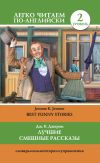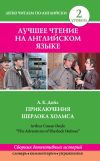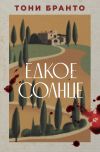Текст книги "Приключения Тома Сойера / The Adventures of Tom Sawyer"

Автор книги: Марк Твен
Жанр: Иностранные языки, Наука и Образование
Возрастные ограничения: +6
сообщить о неприемлемом содержимом
Текущая страница: 1 (всего у книги 6 страниц) [доступный отрывок для чтения: 2 страниц]
Марк Твен / Mark Twain
Приключения Тома Сойера / The Adventures of Tom Sawyer
© Кутумина О. А., адаптация текста, словарь
© ООО «Издательство АСТ», 2019
Chapter I
“TOM!”
No answer.
“TOM!”
No answer.
“What’s happened with that boy, I wonder? You TOM!’
No answer.
Aunt Polly pulled her spectacles down and looked over them about the room; then she put them up and looked out under them. She even bent down, poked under the bed with the broom[1]1
poked under the bed with the broom – пошарила под кроватью щеткой
[Закрыть], and found nothing but the cat.
“Y-o-u-u TOM!”
There was a slight noise behind her and she turned just in time to seize a boy.
“There! What have you been doing in the pantry?”
“Nothing.”
“Nothing! Look at your hands. And look at your mouth. What IS it?”
“I don’t know, aunt.”
“Well, I know. It’s jam—that’s what it is. I’ve told you forty times not to touch it. Where’s my switch?”
“Wow! Look behind you, aunt!”
The old woman turned round, and the boy fled on the instant—he climbed up the high fence, and disappeared over it.
His aunt Polly stood surprised a moment, and then laughed.
“I can never learn anything! He’s played the same trick enough for me to remember it[2]2
He’s played the same trick enough for me to remember it – он проделывал этот трюк со мной достаточно много раз, чтобы я могла его запомнить
[Закрыть]! You can’t learn an old dog new tricks. I’m sure he won’t go to school this afternoon, and I’ll just have to make him work tomorrow, to punish him. It’s hard to make him work on Saturdays, when all the boys are having a holiday. But he hates work more than he hates anything else, so I’ve GOT to find some job for him.”
She was right. Tom didn’t go to school, and he had a very good time.
While Tom was eating his dinner later, and stealing sugar as opportunity offered, Aunt Polly asked him questions—for she wanted to catch him lying.
Said she:
“Tom, it was warm in school, wasn’t it?”
“Yes, mam.”
“Powerful warm, wasn’t it?”
“Yes, mam.”
“Didn’t you want to go in a-swimming, Tom?”
Tom searched Aunt Polly’s face, but it told him nothing. So he said:
“No, ma—well, not very much.”
The old lady reached out her hand and felt Tom’s shirt, and said:
“But you ain’t too warm now, though.”
Tom knew what was coming, now. So he said:
“Some of us pumped water on our heads—mine’s still damp. See?”
Aunt Polly got upset that she had overlooked that bit of circumstantial evidence. Then she had a new inspiration:
“Tom, you didn’t have to undo your shirt collar where I sewed it, to pump on your head, did you? Unbutton your jacket!”
Tom opened his jacket. His shirt collar was securely sewed.
“Bother! Well, I was sure you skipped school and went swimming. But I forgive ye, Tom. This time.”
But then Sid, Tom’s younger brother, said:
“You sewed his collar with white thread, but now it’s black.”
“Why, I did sew it with white! Tom!”
But Tom did not wait for the rest. As he went out at the door he said:
“Siddy, I’ll lick you for that[3]3
I’ll lick you for that—теперь тебе мало не покажется
[Закрыть].”
In a safe place Tom examined two large needles that he had stick into the lapels of his jacket. They both had thread attached to them—one needle had white thread and the other black. He said:
“She’d never noticed if it hadn’t been for Sid. Sometimes she sews it with white, and sometimes she sews it with black. I wish she picked one or the other—I can’t keep track of them!”
Tom was not the model boy of the village. But Sid was—and Tom hated him sometimes.
Within two minutes, or even less, he had forgotten all his troubles because he found a new interesting activity—whistling. He had learned to whistle a couple of days ago and now he decided to practise it.
The summer evenings were long so he had a lot of time ahead.
Then he saw a stranger boy a little larger than himself. Meeting a new-comer of any age of either sex was an important in the poor little village of St. Petersburg. This boy was well dressed—on a week-day. He even had shoes on—and it was only Friday. You could see that he was from the city. The more Tom stared at the stranger, the higher he turned up his nose and the shabbier his own outfit seemed to him. Neither of the boys spoke. If one moved, the other moved—but only to the side; so they were moving in a circle; keeping face to face and eye to eye[4]4
keeping face to face and eye to eye – держались лицом к лицу, глаза в глаза друг с другом
[Закрыть] all the time. Finally Tom said:
“I can lick you!”
“I’d like to see you try it.”
“Well, I can do it.”
“No you can’t, either.”
“Yes I can.”
“No you can’t.”
“I can.”
“You can’t.”
“Can!”
“Can’t!”
An uncomfortable pause. Then Tom said:
“What’s your name?”
“‘Tisn’t any of your business, maybe.”
“Well I’ll make it my business.”
“Well why don’t you?”
“If you say much, I will.”
“Much—much—much. There now.”
“Oh, you think you’re mighty smart, don’t you? I could lick you with one hand tied behind me, if I wanted to.”
“Well why don’t you do it? You say you can do it.”
“Well I will, if you fool with me.”
“Oh yes—I’ve seen whole families in the same fix.”
“Smarty! You think you’re some, now, don’t you? Oh, what a hat!”
“You can lump that hat if you don’t like it. I dare you to knock it off—and anybody that’ll take a dare will suck eggs.”
“You’re a liar!”
“You’re another.”
“You’re a fighting liar.”
“Aw—take a walk!”
“Say—if you give me much more of your sass I’ll take and bounce a rock off’n your head.”
“Oh, of course you will.”
“Well I will.”
“Well why don’t you do it then? What do you keep saying you will for? Why don’t you do it? It’s because you’re afraid.”
“I ain’t afraid.”
“You are.”
“I ain’t.”
“You are.”
Another pause. Presently they were shoulder to shoulder. Tom said:
“Get away from here!”
“Go away yourself!”
“I won’t.”
“I won’t either.”
So they stood, glowering at each other with hate. But neither could get an advantage. Tom said:
“You’re a coward and a pup. I’ll tell my big brother on you, and he can beat you with his little finger, and I’ll make him do it, too.”
“What do I care for your big brother? I’ve got a brother that’s bigger than he is—and what’s more, he can throw him over that fence, too.”
–
“That’s a lie.”
“Your saying so don’t make it so.”
Tom drew a line in the dust with his foot and said:
“I dare you to step over that, and I’ll lick you till you can’t stand up.”
The new boy stepped over promptly, and said:
“Now you said you’d do it, now let’s see you do it.”
“Don’t you crowd me now; you better look out.”
“Well, you said you’d do it—why don’t you do it?”
“For two cents I will do it.”
The new boy took two broad coppers out of his pocket and held them out. Tom struck them to the ground. In an instant both boys were rolling and tumbling in the dirt, gripped together like cats; and for the space of a minute they tugged and tore at each other’s hair and clothes, punched and scratched each other’s nose, and covered themselves with dust and glory. Presently the confusion took form, and through the fog of battle Tom appeared, seated astride the new boy, and pounding him with his fists.
The boy only struggled to free himself. He was crying—mainly from rage.
At last the stranger got out a smothered “Enough!” and Tom let him go and said:
“Now that’ll learn you. Better look out who you’re fooling with next time.”
The new boy went off brushing the dust from his clothes, sobbing, and shouting what he would do to Tom the “next time he caught him out[5]5
next time he caught him out– когда его в следующий раз поймает
[Закрыть].’
When Tom’s turned to go, the new boy took a stone, threw it, hit him Tom between the shoulders and then ran away as fast as he could. Tom chased him home, and waited at the gate for some time, inviting the enemy to come outside. At last the enemy’s mother appeared, and called Tom a bad, evil child.
Tom got home rather late that night, and when he climbed in through the window, he was caught by his aunt immediately. When she saw the state of his clothes her resolution to turn his Saturday holiday into captivity at hard labor became set in stone.
Chapter II
Saturday morning came, and all the summer world was bright and fresh. There was a song in every heart and a smile on every face.
But Tom was not very happy when he appeared in the street with a bucket of whitewash and a brush with a long handle. When he looked at the fence, so long and high, he felt depressed. Sighing, he dipped his brush and passed it along the top plank; repeated the motion; did it again; compared the insignificant whitewashed streak with the enormous continent of unwhitewashed fence, and sat down in the shade, discouraged.
Then he saw Jim, a slave boy, who was running out of the gate with a bucket. Tom himself had always hated bringing water from the town pump. But it seemed better than whitewashing. Tom said:
“I say, Jim, I’ll bring the water if you whitewash a part of the fence.”
Jim shook his head and said:
“I can’t, master Tom. Your aunt said you had to do it all. She’ll be angry if she learns that I helped you.”
“Oh, never you mind what she said, Jim. That’s the way she always talks. Gimme the bucket—I will be gone only a minute. She won’t ever know.”
When the boys noticed Aunt Polly coming out of the house Jim ran away with his bucket and Tom got back to whitewashing[6]6
got back to whitewashing – принялся красить
[Закрыть]. But his energy did not last. He began to think of the fun he had planned for this day. He got out his wealth out of his pocket and examined it—bits of toys, marbles, and trash; enough to buy an exchange of work, maybe, but not enough to buy even half an hour of pure freedom.
At this dark and hopeless moment he found a way out.
He took up his brush and went to work. Ben Rogers—the very boy, of all boys, whose ridicule Tom had been dreading—was walking along the street eating an apple. From time to time he produced melodious sounds: ding-dong-dong, ding-dong-dong, for he was impersonating a steamboat[7]7
he was impersonating a steamboat – изображал пароход
[Закрыть]. As he came closer, he called:
“Tom!”
No answer. Tom was whitewashing the fence; he surveyed his last touch with the eye of an artist, then gave his brush another gentle sweep and surveyed the result, as before. Tom’s mouth watered for the apple, but he continued working. Ben said:
“Hello, old chap!”
Tom turned to Ben.
“Why, it’s you, Ben! I didn’t notice you.”
“I’m going swimming. Don’t you wish you could? But of course you’d rather work—wouldn’t you? Course you would!”
“What do you call work?”
“Why, isn’t THAT work?”
Tom continued his whitewashing, and answered carelessly:
“Well, maybe it is, and maybe it isn’t. All I know is it suits Tom Sawyer.”
“Don’t say you LIKE it. I won’t believe you!”
The brush continued to move.
“Like it? Well, does a boy get a chance to whitewash a fence every day?’
That put the thing in a new light. Ben stopped biting his apple. He was watching Tom’s every move and was getting more and more interested. At last he said:
“Tom, let ME whitewash a little.”
Tom considered it, and then said:
“If it was the back fence I wouldn’t mind and Aunt Polly wouldn’t. But it’s the front fence; it must be done very carefully. There isn’t one boy in a thousand, maybe two thousand, that can do it the way it should be done.”
“Oh, let me just try. Only just a little. I’ll give you the core of my apple[8]8
core of an apple – сердцевина яблока
[Закрыть].”
Tom considered it. He said:
“No—no—It wouldn’t do, Ben. You see, Aunt Polly’s awful particular about this fence—right here on the street, you know—but if it was the back fence I wouldn’t mind and _she_ wouldn’t. Yes, she’s awful particular about this fence; it’s got to be done very careful; I think there ain’t one boy in a thousand, maybe two thousand, that can do it the way it’s got to be done.”
“No—is that so? Oh come, now—lemme just try. Only just a little.”
“Ben, I’d like to, but Aunt Polly—well, Jim wanted to do it, but she wouldn’t let him; Sid wanted to do it, and she wouldn’t let Sid. If you do a bad job—”
“I’ll be just as careful. Now lemme try. Say—I’ll give you the core of my apple.”
“No, Ben, I’m afraid—”
“I’ll give you ALL of it!”
Tom gave the brush to Ben with reluctance in his face, but cheerfulness in his heart . And while the boy worked and sweated in the sun, the retired artist sat on a barrel in the shade close by, dangled his legs, ate his apple, and planned. By the time Ben got tired, Tom had traded the next chance to Billy Fisher for a kite; and when he finished, Johnny Miller bought in for a dead rat and a string to swing it with—and so on, and so on, hour after hour. By the afternoon, Tom had become a wealthy boy. Besides the before mentioned things, he had twelve marbles, a piece of blue bottle-glass to look through, a key that wouldn’t unlock anything, a tin soldier, a kitten with only one eye, the handle of a knife, and a lot of other valuable things.
He had had a nice, good, time, plenty of company—and the fence had three coats of whitewash on it[9]9
fence had three coats of whitewash on it – забор был покрашен в три слоя
[Закрыть].
Tom said to himself that it was not such a hollow world, after all. He had discovered a great law of human action, without knowing it—namely, that in order to make a man or a boy want something, it is only necessary to make it difficult to obtain.
Chapter III
Tom came to the living-room which was their bedroom, breakfast-room, dining-room, and library at the same time. Aunt Polly was sitting by an open window. She was sure that Tom had left long ago, and she was surprised at seeing him.
“May I go and play now, aunt?” he asked.
“What, already? How much have you done?”
“It’s all done, aunt.”
“Tom, don’t lie to me—I can’t bear it.”
“I ain’t, aunt; it is all done.”
Aunt Polly went out to see for herself. When she found the whole fence whitewashed thoroughly, her astonishment was almost unspeakable.
She said:
“So, you can work when you decide to do so, Tom.” And then she added: “But you seldom feel like working[10]10
seldom feel like working – у тебя редко бывает желание работать
[Закрыть]. Well, you can go and play.”
She even gave him an apple as a reward.
Tom went out of the house and hopped the fence. He walked around the block, and eventually came into an alley that led by the back of his aunt’s cow-stable. He was out of the reach of capture and punishment, and quickly walked toward the public square of the village, where two “military” companies of boys had met for conflict. Tom was General of one of these armies, Joe Harper, his friend, was the General of the other. These two great commanders sat together on the side and gave orders to others. Tom’s army won a great victory, after a long and hard-fought battle. Then the dead were counted, prisoners exchanged, the terms of the next disagreement agreed upon, and the day for the necessary battle appointed; after which the armies marched away, and Tom went towards home.
As he was passing by the house where Jeff Thatcher lived, he saw a new girl in the garden—a lovely little blue-eyed creature with yellow hair plaited into two long-tails, white summer frock and embroidered pantalettes. The fresh-crowned hero fell without firing a shot. A certain Amy Lawrence vanished out of his heart and left not even a memory of herself behind. He tried to win her over for a month; she had confessed hardly a week ago; he had been the happiest and the proudest boy in the world only seven short days, and here in one instant she had gone out of his heart like a stranger.
He looked at the new girl, till he saw that she had discovered him; then he pretended he did not know she was present, and began to “show off” in all sorts of absurd boyish ways, in order to win her admiration. Although the girl seemed not to pay attention, she threw a flower to him just before she went into the house.
Tom tried to act indifferent, but then he ran and took the flower between his toes when he was sure that the girl was gone.
He stayed around the house for the rest of the evening, hoping to see more of the girl, but she did not return, so he went back home.
He was in such a good mood that his aunt wondered “what had got into the child.” He took a good scolding about clodding Sid, and did not seem to mind it in the least. He tried to steal sugar under his aunt’s very nose, and got hit over his knuckles for it. He said:
“Aunt, you don’t whack Sid when he takes it.”
“Well, you’d be always into that sugar if I weren’t watching you.”
She stepped into the kitchen, and Sid, happy in his immunity, reached for the sugar-bowl. But Sid’s fingers slipped and the bowl dropped and broke.
That put Tom in a good mood. He said to himself that he would not speak a word, even when his aunt came in, but would sit perfectly still till she asked who did the mischief; and then he would tell.
When the old lady came back and saw the broken bowl she instead struck Tom! He cried out:
“Hold on, now, what are you belting me for?—Sid broke it!”
Aunt Polly paused. But when she got her tongue again, she only said:
“Umf! Well, you probably deserved that anyway, for all the mischief you’ve done.”
Then she felt sorry, and wanted to say something kind and loving; but thought that this would mean she admitted being wrong, and discipline forbade that. So she kept silence.
Tom sulked in a corner. He knew that in her heart his aunt loved him, but he refused to acknowledge it. He pictured himself lying sick unto death and his aunt bending over him asking for a forgiving word, but he would turn his face to the wall, and die with that word unsaid. Ah, how would she feel then? And he pictured himself brought home from the river, dead. How she would throw herself upon him, and how would she cry! But he would lie there cold and white and make no sign. All of this put him in such a melancholy mood that he walked out at one door and into the street.
He wandered for a bit. He saw a log raft in the river, and sat down on its outer edge and contemplated the dreary vastness of the stream. Then he thought of his flower.
He got it out, looked at it, and it improved his mood. He wondered if she would pity him if she knew? Would she cry? Or would she turn coldly away like all the hollow world?
This picture brought such an agony of pleasurable suffering that he thought about it again and again. At last he rose up sighing and walked away.
About half-past nine or ten o’clock he came along the deserted street to where the Adored Unknown lived; he paused a moment; heard nothing. A candle was casting a dull glow upon the curtain of a second-story window. Was she there? He climbed the fence, carefully walked through the plants, and stood under that window. He looked up at it long, and with emotion; then he laid down on the ground under it, with his hands clasped on his chest and holding his flower. He thought that here he would die—out in the cold world, with no shelter over his homeless head. And she would see him in the morning, and oh! would she drop one little tear upon his poor, lifeless body …
The window went up, a maid-servant’s voice said something loudly, and a deluge of water drenched him from head to toe.
Tom sprang up. There was a whiz as of a missile in the air, mingled with the murmur of a curse, and a small form went over the fence and into the darkness.
Chapter IV
On Sunday after breakfast Tom went to learn “his verses”[11]11
went to learn ‘his verses’ – пошел учить стихи (в Библии – группа слов из текста главы, имеющих полный смысл)
[Закрыть] from the Bible. Sid had learned his lesson days before.
Tom tried very hard to the memorize the five verses, and he chose part of the Sermon on the Mount, because he could find no verses that were shorter.
At the end of half an hour Tom had a vague general idea of his lesson, but no more. His cousin Mary took his book to hear him recite, and he tried his best:
“Blessed are the—a—a—”
“Poor—”
“Yes—poor; blessed are the poor—a—a—”
“In spirit—”
“In spirit; blessed are the poor in spirit, for they—they—”
“Theirs—”
“For theirs. Blessed are the poor in spirit, for theirs is the kingdom of heaven. Blessed are they that mourn, for they—they—”
“Sh—”
“For they—a—”
“S, H, A—”
“For they S, H—Oh, I don’t know what it is!”
“Shall!”
“Oh, shall! for they shall—for they shall—a—a—shall mourn—a—a—blessed are they that shall—they that—a—they that shall mourn, for they shall—a—shall what? Why don’t you tell me, Mary?—what do you want to be so mean for?”
“Oh, Tom, I’m not teasing you. I wouldn’t do that. You must go and learn it again. Don’t you be discouraged, Tom, you’ll manage it—and if you do, I’ll give you something ever so nice. There, now, that’s a good boy.”
“All right! What is it, Mary, tell me what it is.”
“Never you mind, Tom. You know if I say it’s nice, it is nice.”
“You bet you that’s so, Mary. All right, I’ll tackle it again.”
That made Tom do his best—and be a success. Mary gave him a brand-new “Barlow” knife worth twelve and a half cents; and the convulsion of delight that swept his system shook him to his foundations. True, the knife would not cut anything, but it was a “sure-enough” Barlow. He was going to try the knife on the furniture when he was called off to dress for Sunday-school.
Mary took care of the process. She made Tom put on a suit that had been used only on Sundays during two years. He now looked much better and felt very uncomfortable. He hoped that Mary would forget his shoes, but she asked Tom to put them on:
“Please, Tom—that’s a good boy.”
So he got into the shoes. Mary was soon ready, and the three children went to Sunday-school—a place that Tom hated with his whole heart; but Sid and Mary were fond of it.
At the door Tom asked another pupil:
“I say, Billy, have you got a yellow ticket?”
“Yes.”
“What’ll you take for it?”
“What’ll you give?”
“Piece of liquorish and a fish-hook.”
So he exchanged one of his “treasures” for a yellow ticket. Then Tom traded a couple of other small things for three red tickets, and a couple of blue ones. He went on buying tickets of different colours ten or fifteen minutes longer.
Then the lesson began. Almost all the children in Tom’s class were noisy, and troublesome. When they came to recite their lessons, no one knew his verses well. However, each pupil got his reward—in small blue tickets; each blue ticket was pay for two learned verses. Ten blue tickets could be exchanged for a red one; and ten red tickets could be exchanged for a yellow one. For ten yellow tickets Mr. Walters (the teacher) gave a very cheap Bible (worth forty cents) to the pupil. So, to get it a pupil had to learn two thousand verses. Mary had collected two Bibles in this way—it cost her two years of work.
Frankly speaking, Tom has never been interested in getting such a prize, but he wanted the glory and success.
In the middle of the lesson Mr. Walters said to the pupils:
“Now, children, I want you all to sit up just as straight and pretty as you can and give me all your attention for a minute or two. There—that is it. That is the way good little boys and girls should do. I see one little girl who is looking out of the window—I am afraid she thinks I am out there somewhere—perhaps up in one of the trees making a speech to the little birds. I want to tell you how good it makes me feel to see so many bright, clean little faces assembled in a place like this, learning to do right and be good.” And so forth and so on.
The latter third of the speech was marred by the recollection of fights among certain of the bad boys, and by the whisperings of the class.
A good part of the whispering was due to the entrance of visitors: Judge Thatcher, brother of the village lawyer and a well-dressed lady, his wife. The lady was leading a child—the girl whom he had already met once and who became his “new love”. When Tom saw this girl he began showing off with all his might[12]12
with all his might – изо всех сил
[Закрыть]—beating other boys, pulling hair, making faces—in a word, he did everything he could to win the girl’s heart.
The visitors were given the seat of honor[13]13
the seat of honor – посадили на почетное место
[Закрыть]. They were from Constantinople, twelve miles away—so they had travelled, and seen the world. Jeff Thatcher, Tom’s classmate, immediately went forward, to be familiar with the great man and be envied by the school.
Mr. Walters tried to show how good he was at teaching. There was one thing that could make his success complete. It was a chance to call an excellent pupil and award him or her with a Bible. He asked the class if anyone had ten yellow tickets. Several pupils had a few yellow tickets, but none had enough.
And now at this moment, when hope was almost dead, Tom Sawyer came forward with nine yellow tickets, nine red tickets, and ten blue ones, and demanded a Bible. This was a thunderbolt out of a clear sky[14]14
This was a thunderbolt out of a clear sky – Это был гром среди ясного неба (пословица)
[Закрыть]. Mr. Walters was shocked, because he had never expected that Tom could win a prize; but he was glad that there was a prize-winner in his class at that moment. Immediately Tom became a school hero. All the boys were all eaten up with envy[15]15
were all eaten up with envy – все мальчики умирали от зависти (очень сильно завидовали)
[Закрыть], especially those who had exchanged their tickets with Tom.
Amy Lawrence was proud and glad, and she tried to make Tom see it in her face—but he wouldn’t look. She wondered; next a dim suspicion came; she watched; and then her heart broke, and she was jealous, and angry, and the tears came and she hated everybody, and Tom most of all.
The teacher gave Tom the prize. But Mr. Walter knew that there was some mystery here. He doubted that the boy knew a dozen verses, not to speak of two thousand.
Tom was introduced to the Judge; but he couldn’t speak, his breath would hardly come, his heart beat fast—partly because of the awful greatness of the man, but mainly because he was her parent. The Judge put his hand on Tom’s head and called him a fine little man, and asked him what his name was. The boy stammered, gasped, and got it out:
“Tom.”
“Oh, no, not Tom—it is—”
“Thomas.”
“Ah, that’s it. I thought there was more to it, maybe. That’s very well. But you’ve another one I daresay, and you’ll tell it to me, won’t you?”
“Tell the gentleman your other name, Thomas,” said Walters, “and say sir. You mustn’t forget your manners.”
“Thomas Sawyer—sir.”
“That’s it! That’s a good boy. Fine boy. Fine, manly little fellow. Two thousand verses is a great many—very, very great many. And you never can be sorry for the trouble you took to learn them; for knowledge is worth more than anything there is in the world; it’s what makes great men and good men; you’ll be a great man and a good man yourself, some day, Thomas, and then you’ll look back and say, It’s all owing to the precious Sunday-school privileges of my boyhood—it’s all owing to my dear teachers– who encouraged me, and watched over me, and gave me a beautiful Bible—a splendid elegant Bible—to keep and have it all for my own, always! That is what you will say, Thomas—and you wouldn’t take any money for those two thousand verses—no indeed you wouldn’t. And now you wouldn’t mind telling me and this lady some of the things you’ve learned—no, I know you wouldn’t—for we are proud of little boys that learn. Now, no doubt you know the names of all the twelve disciples. Won’t you tell us the names of the first two that were appointed?”
Tom was tugging at a button-hole and looking sheepish. He blushed, now, and his eyes fell. Mr. Walters’ heart sank within him. He said to himself, it is not possible that the boy can answer the simplest question—why did the Judge ask him? Yet he felt obliged to speak up and say:
“Answer the gentleman, Thomas—don’t be afraid.”
Tom was silent.
“Now I know you’ll tell me,” said the lady. “The names of the first two disciples were—”
“DAVID AND GOLIAH!”[16]16
David and Goliah – Давид и Голиаф (Голиаф – огромный воин, персонаж Ветхого завета, который был побежден юношей Давидом, будущим царем Иудеи)
[Закрыть]
Let us draw the curtain of charity over the rest of the scene.
Правообладателям!
Данное произведение размещено по согласованию с ООО "ЛитРес" (20% исходного текста). Если размещение книги нарушает чьи-либо права, то сообщите об этом.Читателям!
Оплатили, но не знаете что делать дальше?








































